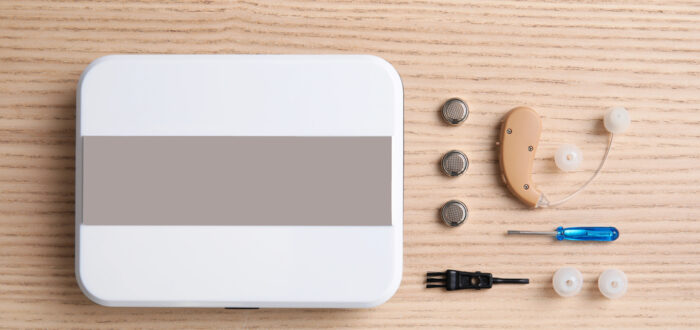For many individuals with hearing loss, hearing aids are invaluable devices that enhance daily communication and improve quality of life. However, to ensure that these devices function effectively and last as long as possible, proper care and maintenance are essential.
Here are five practical tips to help you maintain your hearing aids and keep them in top condition:
- Daily Cleaning
Consistent cleaning is key to maintaining your hearing aids. Every day, gently wipe the entire surface with a soft, dry cloth. Avoid using water, alcohol, or other cleaning solvents that could damage the device.
For a deeper clean, use a wax pick or a small brush designed specifically for hearing aids to remove wax and debris from the microphone ports, sound tubes, and any vents. This prevents blockages that can muffle the sound quality. If available, use a specialized cleaning kit recommended by your audiologist.
- Store Properly When Not in Use
When not wearing your hearing aids, store them in a designated dry and safe place away from moisture and heat. Invest in a drying container or a dehumidifier box specially made for hearing aids.
These containers help extract moisture that may have built up during the day, which is crucial for preventing internal damage, especially in humid environments or after exposure to sweat.
- Change Filters and Wax Guards Regularly
Filters and wax guards protect the inner workings of your hearing aids by preventing wax and other particles from entering. Monitor these guards and replace them as soon as they show signs of clogging. This is typically once a month, but may vary based on your level of wax production or environmental exposure.
Regular replacement helps maintain clear sound transmission and prevents costly repairs.
- Navigation and Wayfinding Assistance
For individuals with hearing loss navigating unfamiliar environments, haptic feedback devices offer assistance in wayfinding and navigation tasks. Wearable devices equipped with haptic feedback can provide directional cues and alerts, guiding users to their destinations safely and efficiently.
Whether it’s navigating public transportation or exploring new surroundings, haptic technology empowers individuals with hearing loss to navigate the world with confidence and independence.
- Handle With Care
Handling your hearing aids with care is crucial for their longevity. Always ensure your hands are clean and dry before touching your hearing aids to prevent dirt and oil from clogging the device.
When not in use, keep them in a sturdy protective case to safeguard against drops and other physical damages. Also, be mindful to remove your hearing aids before applying hair products or makeup, which could potentially clog or damage the device.
Why is Regular Professional Maintenance is Important?
Even with diligent care at home, regular check-ups with your audiologist are essential. These professionals can conduct a thorough cleaning that removes any accumulated wax or debris you might have missed. They can also check for any signs of wear and tear, update software, and make necessary adjustments to ensure that your hearing aids are providing the optimal hearing experience.
Typically, a professional maintenance visit is recommended every six months, or sooner if you are experiencing issues.
Regular maintenance and proper care are crucial to maximizing the performance and extending the lifespan of your hearing aids. By following these five detailed tips, you can ensure that your devices remain in excellent condition and continue to provide the support you need. Remember, taking good care of your hearing aids is not just about maintaining the device, but about ensuring that you continue to enjoy the sounds of life to their fullest.
Need Help? Have a Question? Contact Us Today!
At REM Audiology, our hearing care professionals are on hand to help you with your hearing needs. Hearing assessments are quick and painless, and treating your hearing loss can go a long way towards improving your quality of life. To book your appointment, call us today on (888) 710-5734. Alternatively, click here to contact us online.

